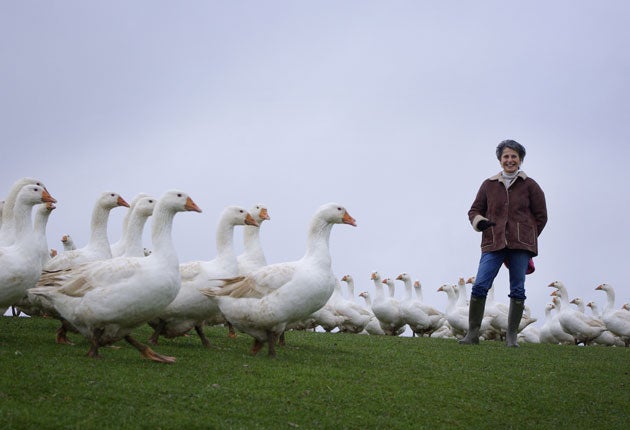Four thousand geese a-laying golden eggs
A Slice of Britain: One farmer's Christmas birds are selling for up to £50 each

Your support helps us to tell the story
From reproductive rights to climate change to Big Tech, The Independent is on the ground when the story is developing. Whether it's investigating the financials of Elon Musk's pro-Trump PAC or producing our latest documentary, 'The A Word', which shines a light on the American women fighting for reproductive rights, we know how important it is to parse out the facts from the messaging.
At such a critical moment in US history, we need reporters on the ground. Your donation allows us to keep sending journalists to speak to both sides of the story.
The Independent is trusted by Americans across the entire political spectrum. And unlike many other quality news outlets, we choose not to lock Americans out of our reporting and analysis with paywalls. We believe quality journalism should be available to everyone, paid for by those who can afford it.
Your support makes all the difference.Two geese stand by a small lake at the end of the long, twisting driveway up to Seldom Seen Farm, the very embodiment of the feathered free-range dream. The birds seem remarkably happy given that it's December, an increasingly bad time to be a goose. Especially considering that the Symingtons of Seldom Seen Farm will this year help a record number of families to dish up the ultimate British Christmas roast.
Claire Symington is not the first farmer's wife to think that keeping a few geese might be fun. That's why she asked her husband, Robert, for a couple when she turned 35. But she's probably the first who, 21 years on, has turned that birthday present into a business that this weekend is supplying its first national retailer.
It transpires that Nemo and Nancy, the lucky pair on the hill, are family pets, so they won't be served up this Friday. Unlike the 4,000 that are waddling around and pecking the dirt in the large fields on either side of the Market Harborough farm, in Leicestershire, when I visit. For them, the clock has been ticking since Michaelmas, the start of autumn but the beginning of end of the road for around 80,000 British geese being fattened up for Christmas. They might lack the run of the place like Nemo and Nancy, but even to my vegetarian eye they don't look too badly off. For now, at least.
Fast forward a couple of weeks and it's a different story. The fields lie empty, the only white now coming from a light dusting of snow, rather than feathers. The outhouses, however, are bulging with geese; dead ones, all dressed in their festive best and awaiting either delivery to the last few butchers or personal collection from the Seldom Seen Farm shop. "Our poor drive. We'll get Ferraris caught on our cattle grid and women teetering out of their cars, all fresh from the hairdresser," Robert says.
The driveway has already seen plenty of action in the past 24 hours. First the Marks & Spencer truck trundled in to pick up the 500 birds that started going into its stores yesterday, and then, at 4.30am, the last of the Symingtons' delivery vans set out for butchers' shops in Oundle, Cambridgeshire, and the West Midlands. "The M&S van turned up in the throes of a blizzard, but luckily at the last minute the heavens shone on us and it was dry," Claire laughs. For the Symingtons, the next few days will pass in a blur. "We never sleep," she says. "It's the accumulation of your whole year. Your work gets condensed and condensed until it's Christmas Eve and you get to collapse."
In these times of 365-day gastronomic gratification, when toddlers take winter blueberries for granted, a goose is one of the few truly seasonal meals: the birds just won't lay before May. Which translates as serious culinary kudos for those dishing it up. Goose is especially popular with younger foodies, those in their 20s or 30s wanting to try something a bit different. Or even their children. "We say if your children like roast duck then they'll love roast goose," Claire says.
It helps, of course, that the likes of Nigella and St Delia have anointed goose as their chosen one. Nigella, if you recall, sparked that extraordinary demand for goose fat a couple of years ago after slathering some on her roast potatoes. Robert, who often mans a stall in Borough Market in London, recalls: "That was an amazing day. The power of the woman: we'd normally sell about 20 or 30 tins but the next day we sold 300. Goose fat is now almost a mainstream part of the business." (Although to the uninitiated goose is terribly fatty, the fat turns out to be "good fat", more like olive oil than the artery-blocking stuff lurking in roast beef, another popular turkey alternative.)
Goose is not cheap – M&S is flogging them for between £40 and £50 each – but per kilo they can cost less than some turkeys, plus their smaller size makes them better for small parties.
Aside from the taste, the other foodie appeal is that geese can't be reared intensively, making them an ethical option. As well as giving them plenty of waddling space, for the Symingtons looking after them well also means killing them well. It's all about a quick snap of the neck and making sure the other geese aren't watching, apparently.
Demand has been stronger than ever this year, and the Symingtons sold out almost two weeks ago. If I were Nemo or Nancy I'd be waddling off as fast as my little webbed feet could manage. But I'm told that they're safe. "They're pets," Claire says. "You just think of it differently."
Join our commenting forum
Join thought-provoking conversations, follow other Independent readers and see their replies
Comments